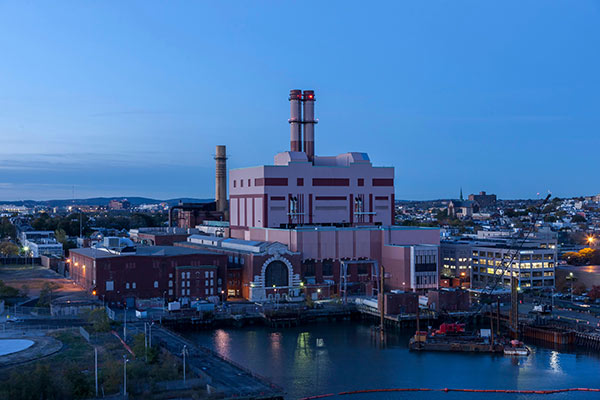This coming Monday October 28, a public meeting is being held at the Tynan Community Center on the two proposals to redevelop the former Boston Edison Power Plant.
The history of the public process has been long and involved with residents, observers, the press, public agencies, the developers and myriad stakeholders weighing in.
As a refresher, the former Boston Edison Power Plant is located next to Conley Terminal, which is owned and operated by Massport—a state agency. A deed restriction was negotiated and agreed to by the prior owner, Exelon Corporation in 2014 that prevents residential housing from being built. Together, the zoning and deed restrictions prohibit housing from being built at the former Boston Edison unless the state takes action and zoning variances are granted.
Redgate/Hilco purchased the former Boston Edison in 2016 with these restrictions on residential housing in place. Conley Terminal is an economic engine for the entire state of Massachusetts that includes $8.2 billion in economic impact, 9,000 direct jobs, 2,500 business from across the state that utilize Conley Terminal. Importantly, Conley Terminal has had five successive years of record-breaking productivity supported by the United States Congress and Massachusetts State Legislature having authorized close to $1 billion investments in the Terminal. These investments helped pay for: the dredging of Boston Harbor, new infrastructure at Conley Terminal, the creation of the Thomas Butler Freight Corridor, and the installation of ship-to-shore power to reduce emissions.
The International Longshoremen Association and Teamsters have voiced their concern with the impacts of residential housing on Conley Terminal. The ILA pointed to experiences at Moran Terminal in Charlestown, where residential buildings built near an active port resulted in decreased hours, resulting in job losses and lost productivity at the port.
The former Boston Edison property is roughly 15 acres and Redgate/Hilco propose to develop approximately 1.8 million square feet. They have submitted two proposals: one commercial proposal, which would not require state action, and one residential component which would require state authorization and zoning relief. Many community activists and watchdog groups have monitored the proposal and raised concerns. Last year, over 1,100 residents submitted a petition to city and state officials objecting to the size and density of the proposal.
Other community members have raised concerns that this height and density will set a negative precedent for the First Street corridor, while others have questioned the impact on an already overburdened bus system, given the location of the former Boston Edison at the start of bus service for the entire neighborhood. The Conservation Law Foundation has also questioned whether conflicts of interest exist due to Redgate’s prior history as a consultant for Massport’s real estate holdings.
Recent real estate developments in South Boston have been trending away from luxury residential and more toward commercial uses. BPDA is reviewing the Notice of Project Change filed by WS Development for Block N of the Seaport Square Project (391 Congress Street) down the South Boston Waterfront to replace residential space with office/research and development space. BPDA is also reviewing proposal for 99 A Street (Coppersmith) for commercial/research and development space.
The bottom line for the South Boston neighborhood is that the numerous moving parts and considerations to this proposal, given its location, is soon coming to a decision with impacts to quality of life issues, as well as the taxpayer investments in and productivity growth at Conley, which affects jobs.
Residents are reminded to attend Monday’s hearing at 6PM at the Tynan Community Center.










